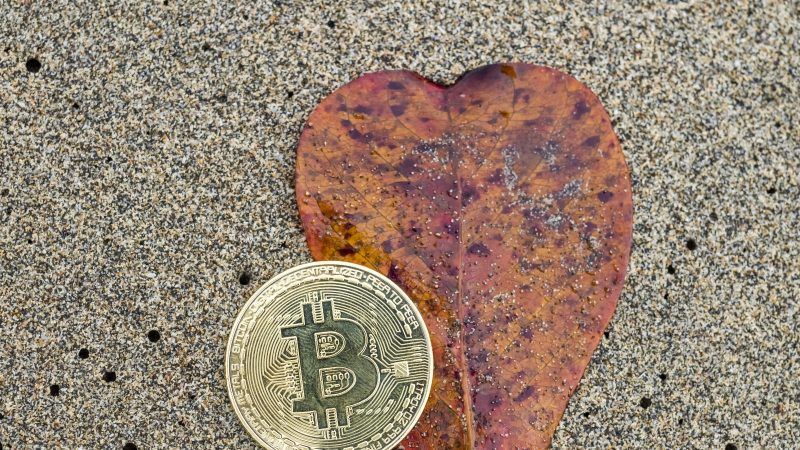Trump and Others Scared of Cryptocurrency Echo Earlier Fears About Cash
If there’s one thing government types can agree on, it’s that nobody should be allowed to buy and sell stuff without permission.

A big problem with cryptocurrencies, President Trump said last week, is that they help people evade government controls on their transactions.
"I am not a fan of Bitcoin and other Cryptocurrencies, which are not money, and whose value is highly volatile and based on thin air. Unregulated Crypto Assets can facilitate unlawful behavior, including drug trade and other illegal activity," the tweeter-in-chief complained in a jab that applies just as much to paper money and coins.
Just as politicians seem to unite in fear of people buying and selling things without permission, the rest of us should be brought together in recognizing that what scares governments about cryptocurrencies—and cash—is exactly what's good about the stuff.
And politicians really are awfully united in their disdain for anonymous and unapproved trade. "Facebook has announced a plan for a crypto currency platform which appears to meet the needs of drug dealers, human traffickers, tax evaders, and terrorists," Rep. Brad Sherman (D-Calif.) harrumphed recently in response to Facebook's announcement of the Libra payment system. Libra actually doesn't seem to lend itself to such uses, but Sherman covered himself by calling for all cryptocurrencies to be banned.
Earlier this year, Texas state Rep. Phil Stephenson (R-District 85) proposed stripping digital transactions of their anonymity in a bill that, thankfully, seems to have quickly died. In a rare example of snoopy global amity, French lawmakers fretted almost simultaneously about "[cryptocurrencies built] to ensure complete anonymity."
This has been going on for a while. Back in 2014, Sen. Joe Manchin (D-W. Va) already schemed to ban Bitcoin, on the grounds that "the virtual currency that is unregulated and unstable, and has been used in illicit activity, including drug trafficking and money laundering."
"A large part of it is used to facilitate tax evasion and a huge spectrum of criminal activities," said Harvard University's Kenneth S. Rogoff, former chief economist of the International Monetary Fund, in a 2016 interview calling for ditching another anonymous means of exchange: cash.
"Paper currency," he said, helps contribute to "drugs, corruption, human trafficking, etc." And yes, he knows that dumping cash limits people's ability to engage in unmonitored exchanges. To him, that's a plus.
"The government's right to tax, regulate and enforce laws trumps individual privacy considerations," Rogoff said.
It's obvious that complaints about cryptocurrencies blend almost seamlessly with concerns about traditional currency. Both offer the potential for direct transactions free of intermediaries and oversight. The debate isn't about bitcoin, or cryptocurrency, or cash and coins—it's about whether we should be free to live unmonitored lives.
Cash is "printed freedom," is how Lars Feld, a member of the German Council of Economic Experts, rebutted a colleague who called for the abolition of cash as a blow against black markets and tax evasion.
"Abolishing cash would hurt consumer sovereignty—the free choice of citizens about their payment instruments," German central banker Carl-Ludwig Thiele has warned, citing Fyodor Dostoyevsky's observation that "Money is coined liberty."
Notably, Feld and Thiele live in Germany, where memories are all-too-fresh of regimes from which many transactions were best kept hidden. They have good reason to understand that submitting to government surveillance of their day-to-day economic lives can be dangerous. Even if today's government is more benign than the Nazi and communist regimes of days past, it's not completely harmless. And there's no telling what rulers of the future might do with records compiled today.
"For many Germans… the use of cash has, to a surprising extent, become a proxy for profound concerns about trust, privacy, and the role of the state," Bloomberg reported last year in a piece that also noted that the country's residents are "enthusiastic users" of Bitcoin.
That Trump and company invoke "unlawful behavior, including drug trade and other illegal activity" as among cryptocurrencies' sins only makes sense if they offer the same objections to cash. To object to one means of exchange on such grounds necessitates objecting to the other.
Besides, Germans, Americans, and people everywhere who turn to cash or cryptocurrency to preserve their privacy owe nobody apologies because somebody else uses it to engage in "illegal activity."
Not to mention that the words "illegal activity" cover a lot of ground here. For those of us who have seen some jurisdictions legalize long-demonized marijuana while others turn gun owners into overnight felons, it's obvious that the term, in this case, just refers to the prejudices of whichever band of political bandits has temporarily gained control of the law-making apparatus and wants to ban trade in disapproved goods and services. If there were actual victims who could file complaints, the government wouldn't need stepped-up surveillance.
Cash and cryptocurrencies also let people exclude private intermediaries from their transactions, as Andrea O'Sullivan pointed out for Reason in February. Banks and other payment services "can flat out refuse to clear any transaction at any time. Maybe they maintain a blacklist of parties or goods for which they will not transfer funds. In the past, governments pressured companies to maintain blacklists. These days, we are seeing more intermediaries build blacklists of their own accord based on things like the political values of their employees."
Basically, cryptocurrency extends the freedom that cash gives us to engage in deals without seeking third-party approval. If Trump and other busybodies don't want us to have the freedom to buy and sell without their approval, that's an indictment of them, not of our chosen money.


Show Comments (32)